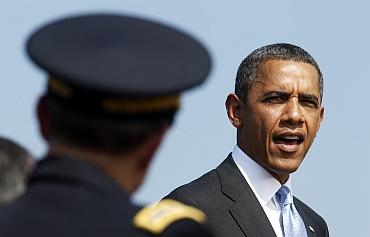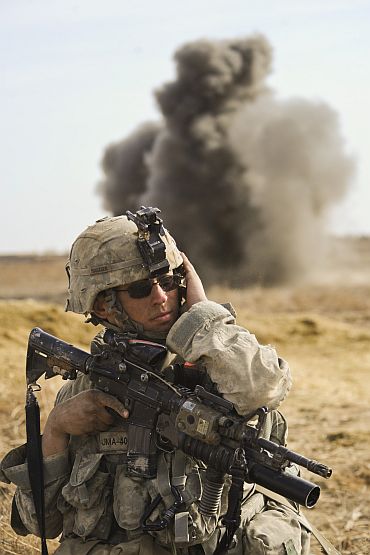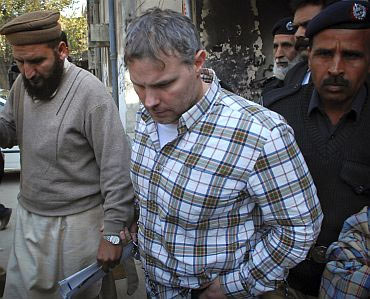Photographs: Kevin Lamarque/Reuters
The United States still intends to withdraw some 33,000 troops from Afghanistan by next year, US President Barack Obama told US Congress.
Obama also claimed that his administration has reversed the Taliban momentum.
"We have seen great progress in our fight against al-Qaeda; we have reversed the Taliban's momentum in Afghanistan; and we continue to see progress in training the Afghan National Security Forces," Obama said in a letter to the Congress, which accompanied his report on Afghanistan and Pakistan.
"This will allow us in the coming year to fully recover the 33,000 US troop surge I announced at West Point in December 2009," Obama wrote in his letter, that was released by the White House.
...
'This is the beginning, but not the end'
Image: A US soldier takes cover from shelling"Beyond that change, we continue to implement the strategy and do not believe further modifications or adjustments to the metrics, resources, or authorities are required at this time.
"Huge challenges remain, and this is the beginning -- but not the end -- of our effort to wind down this war," Obama said.
According to the report reductions of the US military presence that began at Pakistan's direction at the end of the last reporting (January to March 2011) period continued during this reporting period (April to June).
This reduced US support to Pakistan's COIN and CT fight, in part by hindering the ability to maintain relationships and understand the operating realities of key counterparts conducting COIN operations in the Federally Administered Tribal Areas and Khyber Pakhtunkhwa.
...
'Insurgent activity contributed to a decline in security situation'
Image: An American flag is placed in a dirt-filled barrier outside the headquarters of 3rd Platoon near KandaharPhotographs: Bob Strong / Reuters
"This significantly degraded the US ability to support the Pakistani military in its fight against militancy through the provision of training and equipment," the report said.
Years of progress in cross-border coordination and collaboration faced increased challenges, while the drawdown of US military elements in Pakistan continued the trend of a decreased US ability to contribute to Pakistan's COIN and CT efforts, it said.
"Pakistan military operations continued in the FATA, but insurgent activity and high-profile strikes against security and government forces contributed to a decline in the security situation," the report said.
According to the report, despite efforts to develop more robust communication and coordination mechanisms to de-conflict cross-border incidents, the period between July 1 to August 31 saw an increase in incidents along the Afghanistan-Pakistan border as well as an overall decrease in coordination and collaboration.
...
'Davis' detention undermined the US-Pak relationship'
Image: US consulate employee Raymond Davis is escorted by police and officials out of Lahore courtPhotographs: Tariq Saeed/Reuters
"Insurgent activity along the Afghanistan-Pakistan border continues to pose a challenge to stabilisation efforts in both Afghanistan and Pakistan. Attacks occurred along the border of both the northern and southern FATA agencies, with a number of large-scale attacks resulting in high casualty rates for Pakistan's security forces in the north," it said.
Referring to the Raymond Davis case early this year, the report said his seven-week detention by Pakistani authorities undermined the US-Pakistan relationship, slowing ongoing efforts to strengthen the civilian government.
"The detention created division amongst the civilian leadership in Pakistan as well as between Pakistan civilian and military leaders. Civilian authorities were unwilling and unable to recognise the official's diplomatic immunity and deferred the issue to Pakistani courts for resolution," he said.





article